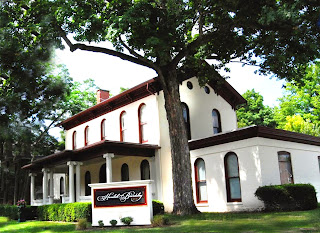So far my favorite is Saint Benedict.

"Heroes don't always carry weapons or ride white horses into battle. Some notable saints have won crucial victories and accomplished lasting good in peaceable, quiet ways. Benedict won an important victory for the Christian faith and for all of Western civilization by organizing religious communities during a turbulent time in Europe. A hero of his era, he patiently gave structure to the monastic movement established earlier by Saint Basil and others, setting rules by which men and women lived together as Christian brothers and sisters in an ordered and productive way.
The monasteries themselves were not the major contribution. Rather, it was the work they did. through the monasteries he established, skills like bookbinding, painting, and stained-glass making were saved during the darkest times of the Dark Ages, when savage invasions and wars dominated people's lives. In Benedict's harmonious religious houses, music, art, and literature were preserved, treasured, and developed, and the Graeco-Roman cultural heritage was kept alive.
He was born in Italy in 480. As he grew up, daily life seemed unstable and the world was chaotic. Like young men and women of different centuries (including our own), Benedict chose to remove himself from the society he saw collapsing around him. However, instead of escaping his world through drunkenness or the sensual excesses of the decaying Roman culture, Benedict hid out in a cave and devoted himself to prayer and meditation. Soon his reputation for Christian holiness of life became well known throughout Italy. Searching pilgrims found their way to his cave, looking for some kind of structure for their lives in a chaotic society. The right man at the right time, Benedict offered people of all ages and backgrounds a new and orderly way for a Christian communal life, one that visibly expressed being in the world but not of the world.
Blending Roman law with Christian tradition and mixing in a good measure of common sense, Benedict established what came to be known as the "Holy Rule" for monks. Its 73 chapters outlined a life of stability that included a strict daily routine, mannerly living, and obedience to those in authority. Observing that "idleness is the enemy of the soul," Benedict made sure that the brothers and sisters in his religious communities would work as well as pray and study.
Benedict's example of balancing work with worship and action with reflection is a model for each of us to follow in our own daily lives. A special feature of his rule was its emphasis on Christian hospitality. Rule 3 states, "All guests who come to a monastery shall be received as though they were Christ." By welcoming strangers and preserving learning, the Benedictine monasteries held together the cultural fabric of Europe through challenging times. Benedict's rule became a blessing to the Middle Ages and provided a legacy that benefits us still today as we put our Christian lives in order."
The monasteries themselves were not the major contribution. Rather, it was the work they did. through the monasteries he established, skills like bookbinding, painting, and stained-glass making were saved during the darkest times of the Dark Ages, when savage invasions and wars dominated people's lives. In Benedict's harmonious religious houses, music, art, and literature were preserved, treasured, and developed, and the Graeco-Roman cultural heritage was kept alive.
He was born in Italy in 480. As he grew up, daily life seemed unstable and the world was chaotic. Like young men and women of different centuries (including our own), Benedict chose to remove himself from the society he saw collapsing around him. However, instead of escaping his world through drunkenness or the sensual excesses of the decaying Roman culture, Benedict hid out in a cave and devoted himself to prayer and meditation. Soon his reputation for Christian holiness of life became well known throughout Italy. Searching pilgrims found their way to his cave, looking for some kind of structure for their lives in a chaotic society. The right man at the right time, Benedict offered people of all ages and backgrounds a new and orderly way for a Christian communal life, one that visibly expressed being in the world but not of the world.
Blending Roman law with Christian tradition and mixing in a good measure of common sense, Benedict established what came to be known as the "Holy Rule" for monks. Its 73 chapters outlined a life of stability that included a strict daily routine, mannerly living, and obedience to those in authority. Observing that "idleness is the enemy of the soul," Benedict made sure that the brothers and sisters in his religious communities would work as well as pray and study.
Benedict's example of balancing work with worship and action with reflection is a model for each of us to follow in our own daily lives. A special feature of his rule was its emphasis on Christian hospitality. Rule 3 states, "All guests who come to a monastery shall be received as though they were Christ." By welcoming strangers and preserving learning, the Benedictine monasteries held together the cultural fabric of Europe through challenging times. Benedict's rule became a blessing to the Middle Ages and provided a legacy that benefits us still today as we put our Christian lives in order."
Even today, I see works like those of Saint Benedict all around me, and I'm thankful for the people who carry out these works. I pray for the courage to put Christ first in all things; to be dedicated, patient, and hospitable in this and every place, and to be a blessing to many.





.JPG)